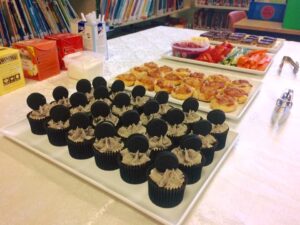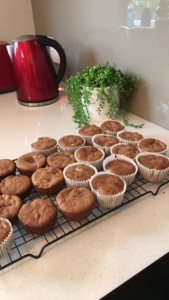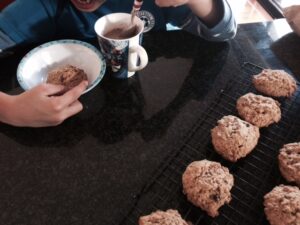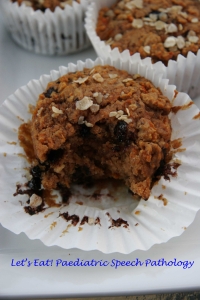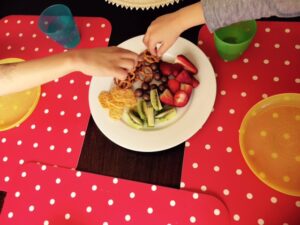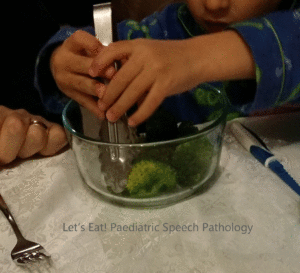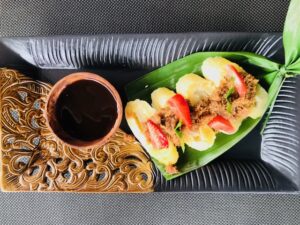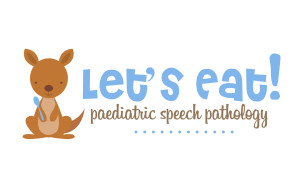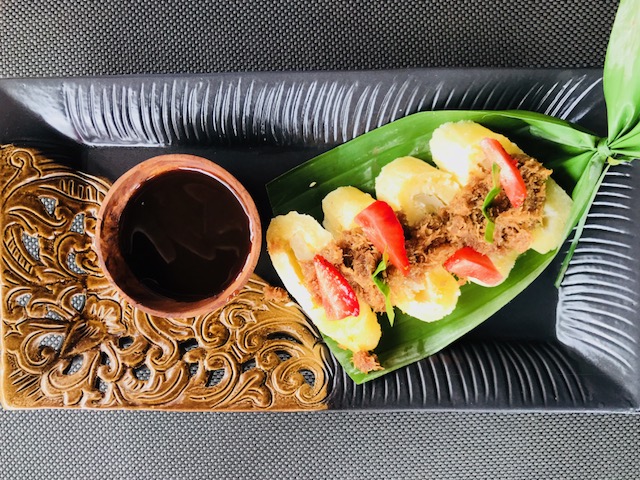
I had a conversation with a mum today about her child who has recently started watching you tube videos and songs about food and now says “this is a healthy food”. She understandably struggled with how to guide him with food from an emotional and nutritional perspective.
This is a tough one in the parenting world because marketing, culture and celebrations have created categories for food = some of it is good (like carrots) and some of it is bad (like cake, lollies and ice cream)
But don’t we give children cake for birthdays? but then in a child’s mind – why would we give “bad” food to children for their birthday?
Schools and preschools healthy eating guidelines don’t make this any easier: red light food is a cupcake but green light food is a muffin – is a muffin “less bad” than a cake? According to schools – maybe? because one is accepted into schools and one is not. Hmmmm…..
Let’s add some research to this theory – Dr Katja Rowell and Jenny McGlothlin in their book, “helping your child with extreme picky eating” discuss the study by Fisher and Birch (2000) which found that children as young as four report feel guilty if they eat forbidden food. Even plainer- if a child eats bad food- they think they are bad too.
Even in the adult world, this is pushed down our throats so to speak in the dieting world (no carbs for you, sugar free diet for you and onwards). But Psychologists also tell us not to “forbid” ourselves with certain foods (especially if we are trying to lose weight) because we will end up binging on this food after our “diet”.
Another expert, Ellyn Satter, Dietitian, encourages us NOT to have “forbidden foods” as it only makes the children crave it more. It makes total sense doesn’t it – if I tell you that you can’t eat hot chips, you will think about the small, taste and your desire for them will increase ten fold! (hmmmm hot chips – yum). It’s human nature to desire foods and it’s not you or your child being weak.
Here is what I told her – FOOD IS FOOD! All made and enjoyed equally. Food nourishes our bodies but also provides connection and pleasure. But here is another word you can also use – “everything in moderation” (or for younger kids – we all need the right amounts of food/ the right balance to help our bodies feel good). Eating cake all day won’t make my body feel good nor will eating carrot all day.
Eating cake is a lovely way to celebrate your birthday and eating crunchy carrots (for me with a hummus dip) is a delicious afternoon tea. Everything in balance and everything enjoyed WITHOUT feeling guilty.
The wise women at Helping your child with Extreme Picky Eating also talk about using the word “treat” for sweets and expensive foods to help keep food on a level playing field. They use the following examples in their book which describe the concept really well
“What a treat to get ice cream in a hot day” And “This steak is such treat”
I like this wording (ie “treat” foods) better that “sometimes” vs “everyday” foods because it’s tricky to understand when the food is presented if it’s only “sometimes”. In my house, we have ice cream for weekend dessert and yoghurt for weekday dessert. I don’t know if my kids think yoghurt is a “treat” food. But they certainly understand prawns as a “treat” food as much as ice cream is a “treat” food. It’s a work in progress at my house but I’m determined to have my kids develop a good relationship with food.
Can I ask you something as well? Can you stop talking about dieting or “clean healthy eating” in front of your children as well please? It’s hard when we live in this dieting crazy world but if you say you are only clean eating – what does that mean you were eating before? Dirty food?
Before I finish – one last favour – don’t talk about your figure in front of your child. I was walking into the shops last Monday and a mother was walking out (tugging on her shirt) as she asked her tiny kids (maybe a toddler and pre-schooler?) in the shopping trolley if she was fat. Her pre-schooler said – “yes you are fat mummy”. And she laughed and said, “you’re not supposed to say that”. My heart cried. I wished she had used a different word in that conversation (e.g. was my joke funny?) and didn’t reflect the insecurities and emotions on her figure. Mama – if you are out there – you are beautiful, clever and funny in every way!! Your kids adore you and love you no matter if you are slim, cuddly or even if their arms don’t touch when they cuddle you around your waist – it doesn’t matter to them. Much love to you dear Mama xoxox Val
Until next time,
Wishing you happy and connected moments in life
Val
Paediatric Feeding Speech Pathologist @ Let’s Eat! Paediatric Speech Pathology
This website and information on this blog post is provided for educational purposes. It is not meant or intended to replace Speech Pathology assessment and management nor medical or nutritional care for a child. It is recommended that you discuss any concerns or questions you might have with your Speech Pathologist and managing Doctor and develop an individualised team plan specifically for your child.
About the author of this blog post
Valerie Gent is an Australian based Speech Pathologist with 15 years experience in Paediatric Feeding. She has opened a private practice called ‘Let’s Eat! Paediatric Speech Pathology’ in 2013 for Newcastle based babies and children with feeding difficulties. Valerie is passionate about working in the area of paediatric feeding and special needs and has been involved in the teaching and training of Australian Speech Pathology University students and allied health professionals. Prior to starting her private practice, she worked in acute paediatric hospitals in neonatal intensive care units, feeding clinics and clinics for children with special needs for 10 years. You can find out more about Valerie Gent and ‘Let’s Eat! Paediatric Speech Pathology’ via her website www.letseatspeech.com.au and Facebook page www.facebook.com/LetsEatPaediatric SpeechPathology or email her on valerie.gent@letseatspeech.com.au

